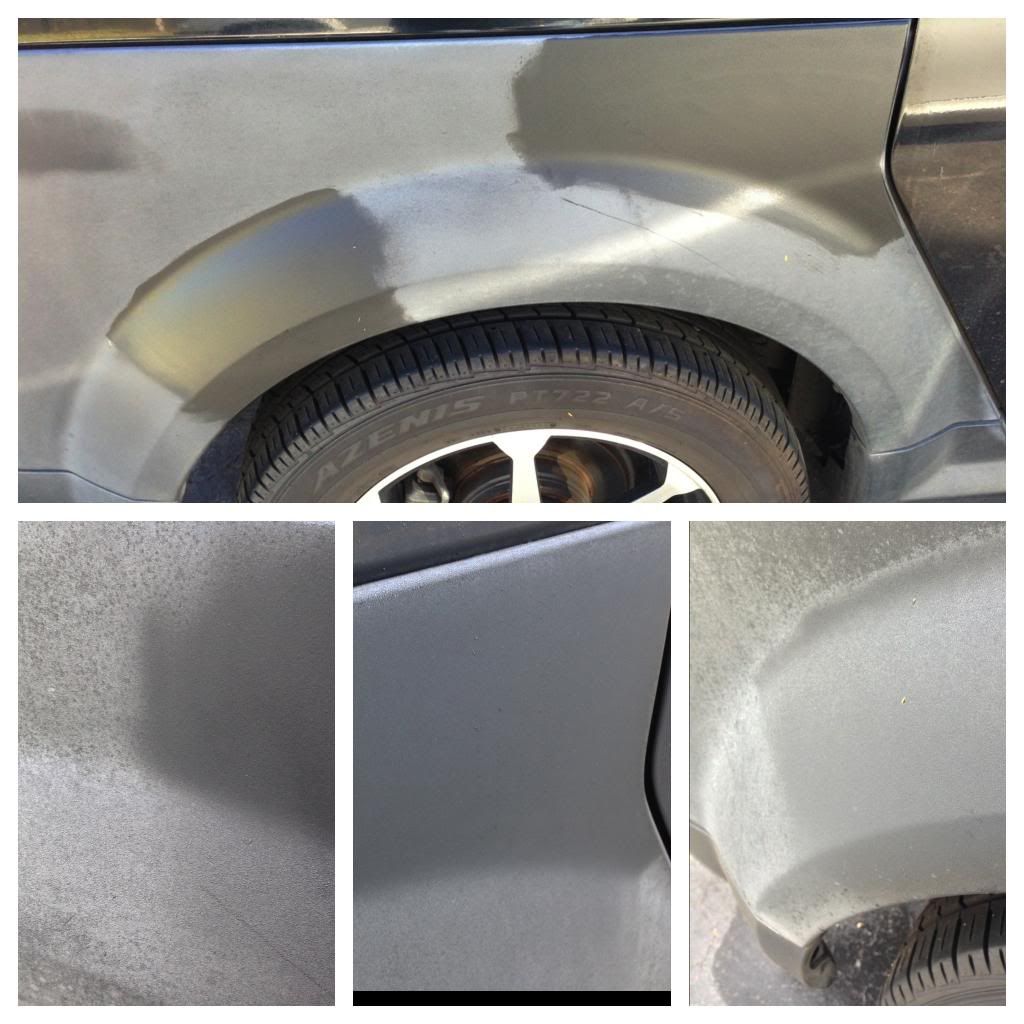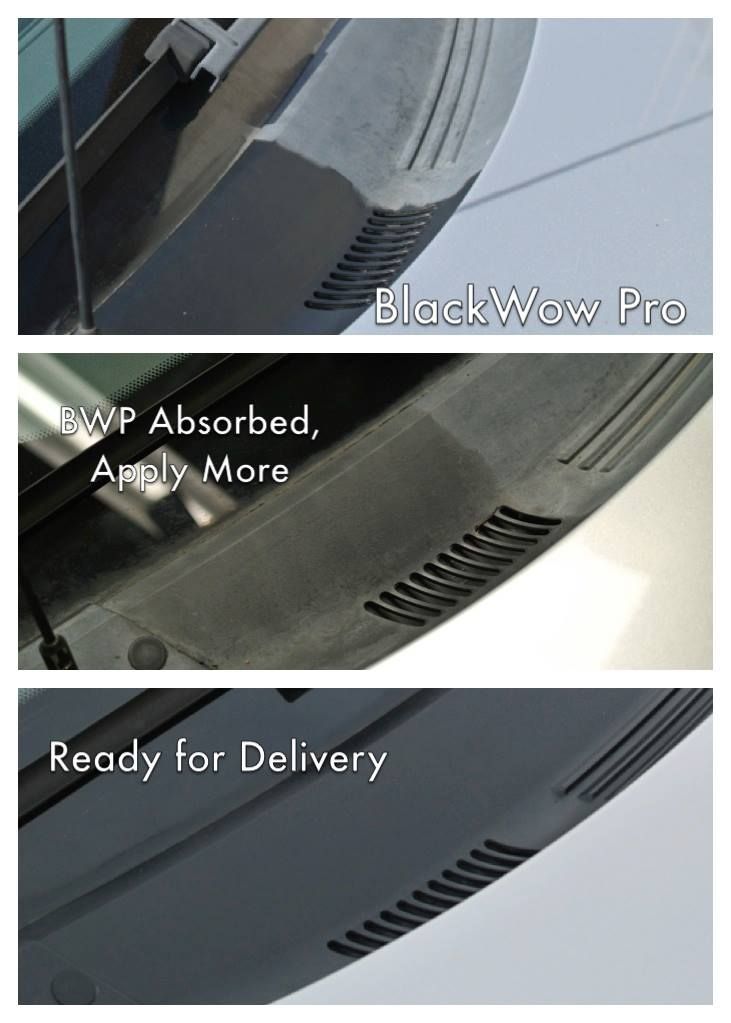Trim 101 Basics
In our ongoing effort to get the best repeatable results with our product, a number of terms and concepts have been developed. Fortunately if you are not interested in the "science" behind BlackWow™, that's ok because all of this information can be summed up in simple way. The key to achieving maximum longevity is to make sure you apply BlackWow™ multiple times until it no longer turns grey.
- Graceful Degradation
- Material Saturation
- Long Term Soaking
- Rehydrating
- Cumulative Effect
- Maintaining Uniformity
Graceful Degradation
Graceful Degradation is a term used in the IT industry to describe what sort of fail safes and built-in backups a system has at the point of failure. In the detailing world, this relates specifically to what happens at the end of the life of a product. It's easy to apply a product and say "Look how good it looks" and believe that a manufacturer says "It will last for XXX amount of time" yet there are many variables that can affect this that include the composition or nature of the material as well as environmental factors.
This is also what I call looking good on your way out. When using car care products, many products just "disappear" one day and you realize it's time to use more. Other products actually start to peel, fall off in clumps, or otherwise look miserable. I believe that a product should degrade gracefully so that as it nears the end of it's life it continues to look good instead of becoming embarrassing. That's the concept behind the BlackWow™ products. When people ask us how long our product lasts, the true answer lies in what is considered an acceptable amount of degradation. We have proven that after 3 to 4 months, the product looks as good as it was applied on Day 1. After 5 to 9 months it starts to fade a little bit, but remains uniform. Uniformity is an important factor to retaining its look over time and many people would say that it is still there. From 9 to 14 months it fades more significantly. So when asked how long does the product last, the answer isn't quite as simple as giving a specific duration.
This is also what I call looking good on your way out. When using car care products, many products just "disappear" one day and you realize it's time to use more. Other products actually start to peel, fall off in clumps, or otherwise look miserable. I believe that a product should degrade gracefully so that as it nears the end of it's life it continues to look good instead of becoming embarrassing. That's the concept behind the BlackWow™ products. When people ask us how long our product lasts, the true answer lies in what is considered an acceptable amount of degradation. We have proven that after 3 to 4 months, the product looks as good as it was applied on Day 1. After 5 to 9 months it starts to fade a little bit, but remains uniform. Uniformity is an important factor to retaining its look over time and many people would say that it is still there. From 9 to 14 months it fades more significantly. So when asked how long does the product last, the answer isn't quite as simple as giving a specific duration.

Coating has failed

Top picture- BlackWow™ Pro applied in January 2013. Bottom pix show closeups of applied areas in November 2013. Color has faded but uniformity remains and still looks more than acceptable.



Material Saturation
This leads us to the idea of "Material Saturation" and "Long Term Soaking". BlackWow™ products have always lasted a long time once the material was saturated with product. Our products are designed to absorb. BlackWow™ Pro absorbs in minutes instead of days like Classic. Once the material won't absorb anymore, you have reached the optimal point of application. Traditionally, you apply a product once and if you see it fade, the natural response is to think it has failed. With BlackWow™ products because so little is needed per application, a second or third application is sometimes needed to reach saturation.
Once a material is saturated, how long does it stay this way? It depends on a number of factors of course, but there is documented proof of cumulative improvement on successive applications. With BlackWow™ Classic I showed on a truck cowling back in 2010 how 3 applications spread out over a 10 hour day looked twice as dark as trying to apply 3 applications in 1 hour.
With BlackWow™ Pro we have found that the first application often lasts 4 to 6 months here in SoCal, but a repeat application after 3 to 4 months can extend that another 8 to 14 months because you have a base application that has been soaking for months, it provides an even better foundation. However like I said before, there are materials that just won't absorb well and durability is greatly reduced. This can happen on previously treated materials or even just hard plastics.
A quick test to determine how successful the material absorbed is to apply BlackWow™ Pro and let it soak for 20 minutes. Take a microfiber towel with some 70% alcohol and swipe it a few times. If it looks dry, the BWP can't absorb and durability will be similar to that of a normal dressing. If there is no change, you can pretty much bet that durability will be for a very long time.
Once a material is saturated, how long does it stay this way? It depends on a number of factors of course, but there is documented proof of cumulative improvement on successive applications. With BlackWow™ Classic I showed on a truck cowling back in 2010 how 3 applications spread out over a 10 hour day looked twice as dark as trying to apply 3 applications in 1 hour.
With BlackWow™ Pro we have found that the first application often lasts 4 to 6 months here in SoCal, but a repeat application after 3 to 4 months can extend that another 8 to 14 months because you have a base application that has been soaking for months, it provides an even better foundation. However like I said before, there are materials that just won't absorb well and durability is greatly reduced. This can happen on previously treated materials or even just hard plastics.
A quick test to determine how successful the material absorbed is to apply BlackWow™ Pro and let it soak for 20 minutes. Take a microfiber towel with some 70% alcohol and swipe it a few times. If it looks dry, the BWP can't absorb and durability will be similar to that of a normal dressing. If there is no change, you can pretty much bet that durability will be for a very long time.

Click Image to Zoom
Long Term Soaking
This leads us to the idea of "Material Saturation" and "Long Term Soaking". BlackWow™ products have always lasted a long time once the material was saturated with product. Our products are designed to absorb. BlackWow™ Pro absorbs in minutes instead of days like Classic. Once the material won't absorb anymore, you have reached the optimal point of application. Traditionally, you apply a product once and if you see it fade, the natural response is to think it has failed. With BlackWow™ products because so little is needed per application, a second or third application is sometimes needed to reach saturation.
Once a material is saturated, how long does it stay this way? It depends on a number of factors of course, but there is documented proof of cumulative improvement on successive applications. With BlackWow™ Classic I showed on a truck cowling back in 2010 how 3 applications spread out over a 10 hour day looked twice as dark as trying to apply 3 applications in 1 hour.
With BlackWow™ Pro we have found that the first application often lasts 4 to 6 months here in SoCal, but a repeat application after 3 to 4 months can extend that another 8 to 14 months because you have a base application that has been soaking for months, it provides an even better foundation. However like I said before, there are materials that just won't absorb well and durability is greatly reduced. This can happen on previously treated materials or even just hard plastics.
A quick test to determine how successful the material absorbed is to apply BlackWow™ Pro and let it soak for 20 minutes. Take a microfiber towel with some 70% alcohol and swipe it a few times. If it looks dry, the BWP can't absorb and durability will be similar to that of a normal dressing. If there is no change, you can pretty much bet that durability will be for a very long time.
Once a material is saturated, how long does it stay this way? It depends on a number of factors of course, but there is documented proof of cumulative improvement on successive applications. With BlackWow™ Classic I showed on a truck cowling back in 2010 how 3 applications spread out over a 10 hour day looked twice as dark as trying to apply 3 applications in 1 hour.
With BlackWow™ Pro we have found that the first application often lasts 4 to 6 months here in SoCal, but a repeat application after 3 to 4 months can extend that another 8 to 14 months because you have a base application that has been soaking for months, it provides an even better foundation. However like I said before, there are materials that just won't absorb well and durability is greatly reduced. This can happen on previously treated materials or even just hard plastics.
A quick test to determine how successful the material absorbed is to apply BlackWow™ Pro and let it soak for 20 minutes. Take a microfiber towel with some 70% alcohol and swipe it a few times. If it looks dry, the BWP can't absorb and durability will be similar to that of a normal dressing. If there is no change, you can pretty much bet that durability will be for a very long time.



Huge Improvement at First

BlackWow Classic has Absorbed

Applied again and looking much better

3 Coats Applied in 1 hour is not as dark as 3 coats applied over 10 hours.
Maintaining Uniformity- We bring uniformity to an imperfect world
No matter what shade of darkness your trim is, if it's not uniform, it will always look worse than one that is lighter but uniform.
When judging longevity of any product, it's imperative to understand how uniformity impacts the appearance of those results.
When judging longevity of any product, it's imperative to understand how uniformity impacts the appearance of those results.


Lasts for years on garage kept show cars!

Uniformity Makes all the Difference

Uniformity Makes all the Difference
